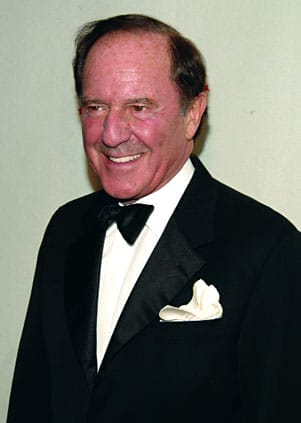 Mort Zuckerman made his first impact in real estate, but his media appearances—from The McLaughlin Group to The Colbert Report—have made him a public figure. The comparison with another famous Wharton alumnus is inevitable. As Forbes magazine wrote in 2005: “[T]hough Zuckerman is more low-key than [Donald] Trump, the two share enormous drive and ego. Zuckerman’s intense side does peek out sometimes. As a pitcher in the annual celebrity softball game in tony Sag Harbor, NY, Zuckerman throws fastballs while others just lob them in.”
Mort Zuckerman made his first impact in real estate, but his media appearances—from The McLaughlin Group to The Colbert Report—have made him a public figure. The comparison with another famous Wharton alumnus is inevitable. As Forbes magazine wrote in 2005: “[T]hough Zuckerman is more low-key than [Donald] Trump, the two share enormous drive and ego. Zuckerman’s intense side does peek out sometimes. As a pitcher in the annual celebrity softball game in tony Sag Harbor, NY, Zuckerman throws fastballs while others just lob them in.”
In his first role as real estate magnate, Zuckerman serves as chairman of the board of the real-estate investment trust Boston Properties, Inc., whose recent projects include the Times Square Tower in New York City, and which holds well over a hundred buildings in Boston, San Francisco, and Washington, DC. He co-founded the company in 1970 after seven years at the real-estate firm Cabot, Cabot, and Forbes, where he rose to senior vice president, then chief financial officer.
When it comes to his media career, Zuckerman doesn’t just make headlines—he publishes them. As chairman and editor-in-chief of Washington, DC-based U.S. News & World Report, he also contributes an opinion column that showcases a unique political worldview, often as hard to pin down as the man himself. He is chairman and co-publisher of the New York Daily News, and has been involved with numerous publications over the years, including ownership of the Atlantic Monthly for almost 20 years. To round out his active status in the realm of public debate, he has appeared often as a guest on TV programs ranging from The McLaughlin Group on PBS to The Colbert Report on Comedy Central.
A native of Montreal, Zuckerman earned undergraduate and law degrees from McGill University and an LLM from Harvard Law in addition to his Wharton MBA. Among his many activities, Zuckerman serves as a trustee for New York University, Memorial Sloan-Kettering Cancer Institute, and the Aspen Institute; and as a member of the Council on Foreign Relations, the Washington Institute for Near East Studies and the International Institute for Strategic Studies.


























